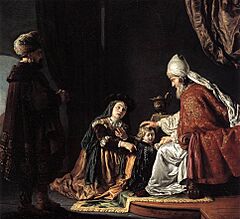Song of Hannah facts for kids

The Song of Hannah is a beautiful poem found in the Books of Samuel in the Bible. The story tells us that a woman named Hannah prayed this song to thank God for the birth of her son, Samuel. She had waited a long time to have a child, so she was very joyful.
This song is a prayer of thanks and praise. It shares ideas with other famous biblical songs, like Psalm 113 and the Magnificat, a song sung by Mary, the mother of Jesus, in the New Testament.
Contents
What the Song is About
Hannah's song is about praising God and celebrating how He can change people's lives in surprising ways. It also looks forward to a time when God will choose a king to lead the people.
The song starts with Hannah's personal happiness. She is thankful that God gave her a son. Then, it talks about bigger ideas, like how God helps everyone who is humble and brings down those who are proud. This idea of "reversal," where the weak become strong and the strong become weak, is a major theme in the Books of Samuel. It sets the stage for the stories that follow, showing how God can change the fate of a whole nation.
A Song About a Future King
One of the most interesting parts of the song is in verse 10, where it mentions a "king." At the time Hannah lived, Israel did not have a king. This has led many people to believe the song was a look into the future. They think it might have been pointing toward the time when Israel would have great kings, like David. It showed that even in difficult times, people hoped for a strong and fair leader chosen by God.
Some experts believe this part of the song shows that the idea of having a king was already on people's minds. The nation was facing many problems, and a king seemed like a good solution.
The Words of the Song
This is the text of the Song of Hannah from the Bible.
1 Samuel 2:1–10
And Hannah prayed and said:
“My heart rejoices in the Lord; my strength is exalted in the Lord. I smile at my enemies, because I rejoice in Your salvation.
“No one is holy like the Lord, for there is none besides You, nor is there any rock like our God.
“Talk no more so very proudly; let no arrogance come from your mouth, for the Lord is the God of knowledge; and by Him actions are weighed.
“The bows of the mighty men are broken, and those who stumbled are girded with strength. Those who were full have hired themselves out for bread, and the hungry have ceased to hunger. Even the barren has borne seven, and she who has many children has become feeble.
“The Lord kills and makes alive; He brings down to the grave and brings up. The Lord makes poor and makes rich; He brings low and lifts up. He raises the poor from the dust and lifts the beggar from the ash heap, to set them among princes and make them inherit the throne of glory.
“For the pillars of the earth are the Lord’s, and He has set the world upon them. He will guard the feet of His saints, but the wicked shall be silent in darkness.
“For by strength no man shall prevail. The adversaries of the Lord shall be broken in pieces; from heaven He will thunder against them. The Lord will judge the ends of the earth. “He will give strength to His king, and exalt the strength of His anointed.”
(1 Samuel 2:1–10)
Why the Song is Important Today
Hannah's song is special because it gives a voice to a woman in the Bible, showing her deep faith and joy. It highlights that personal stories of family and thankfulness are just as important as big national events.
In Judaism
In the Jewish faith, the Song of Hannah is considered a perfect example of how to pray. It is read in the synagogue on Rosh Hashanah, the Jewish New Year. It teaches people to speak to God with an open and honest heart.
In Christianity
The song is also very important in Christianity. It has many things in common with the Magnificat, the song that Mary sang when she learned she would be the mother of Jesus.
Both Hannah and Mary were faithful women who were blessed with special sons through God's help. Hannah's son, Samuel, became a great prophet. Mary's son, Jesus, is the central figure of Christianity. Because of these similarities, many see Hannah's story as a preview of Mary's.
The Song of Hannah, sometimes called the "Canticle of Anna," is used as a prayer in some Christian churches, including the Catholic Church and many Protestant churches.
See also
- 1 Samuel 2
- Luke 1
- Magnificat - Mary's song, which is very similar to the Song of Hannah
 | John T. Biggers |
 | Thomas Blackshear |
 | Mark Bradford |
 | Beverly Buchanan |

